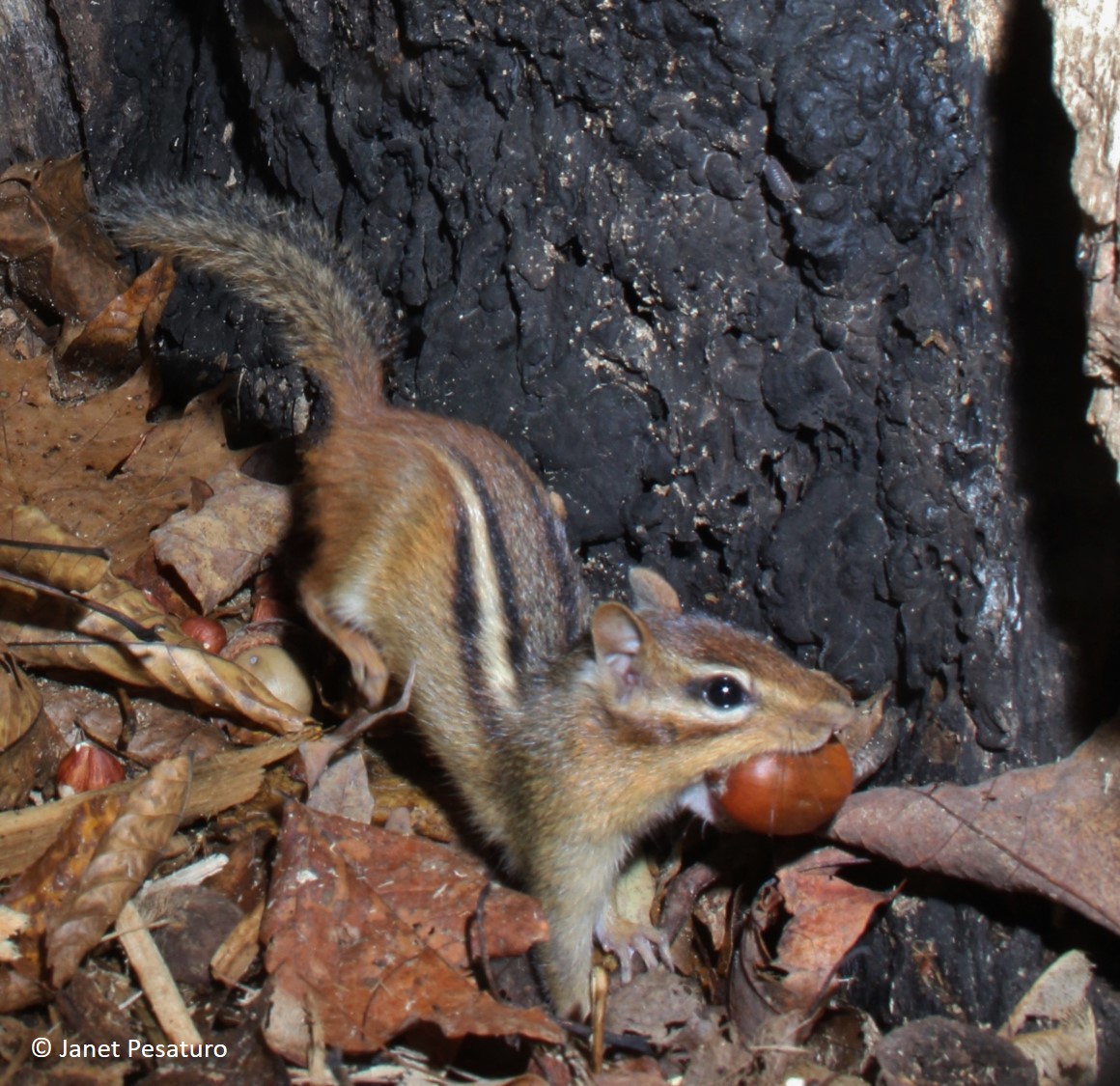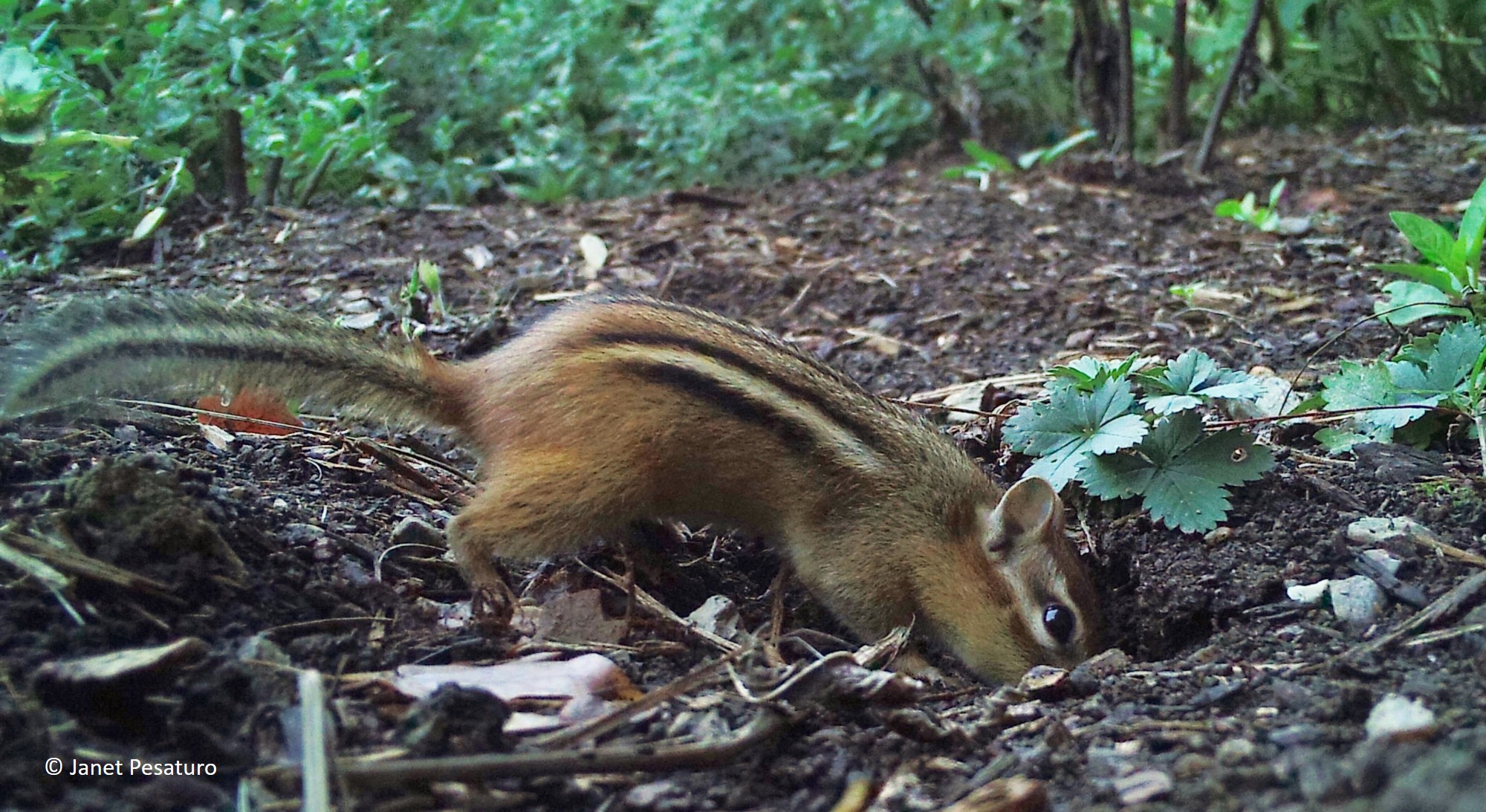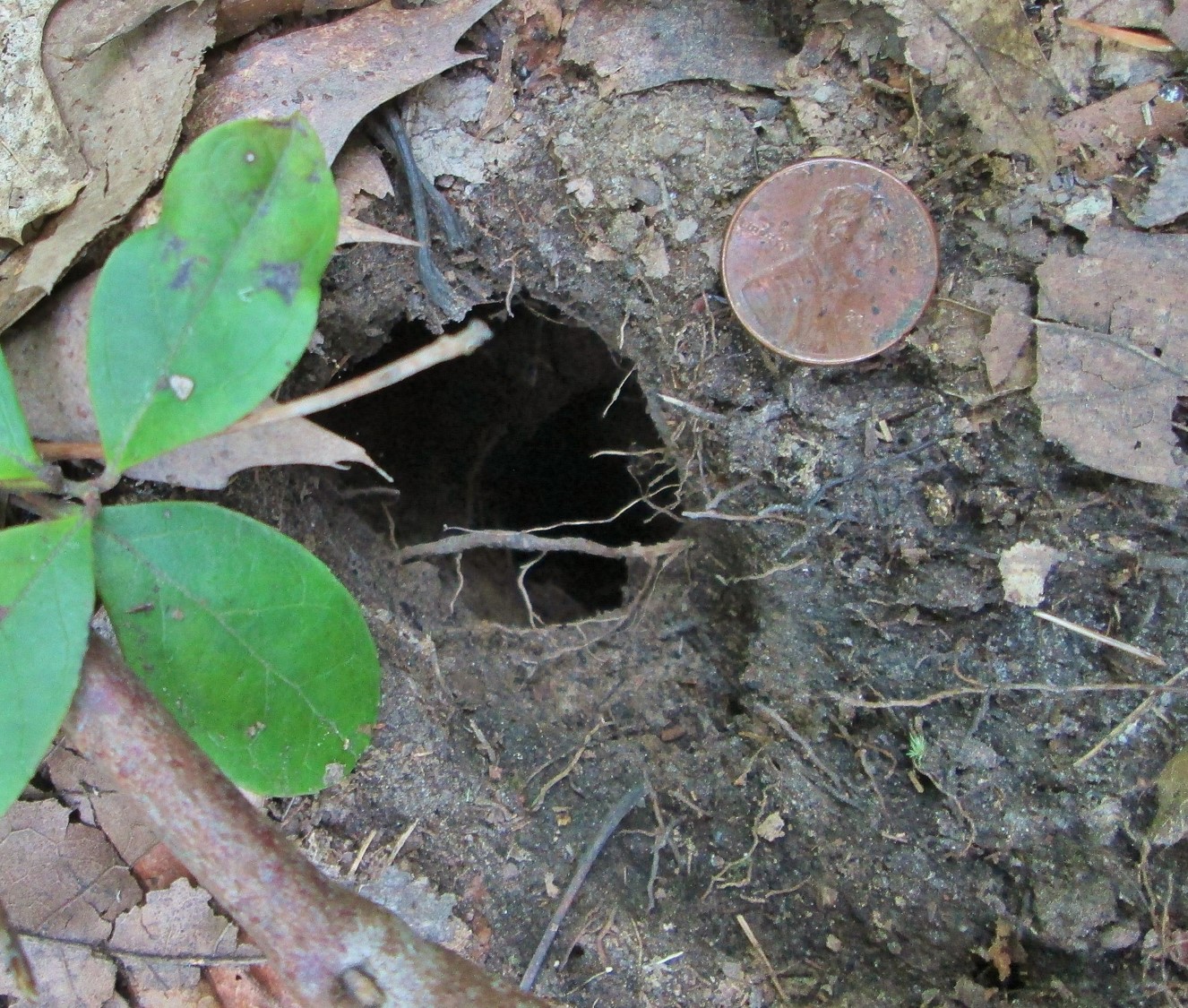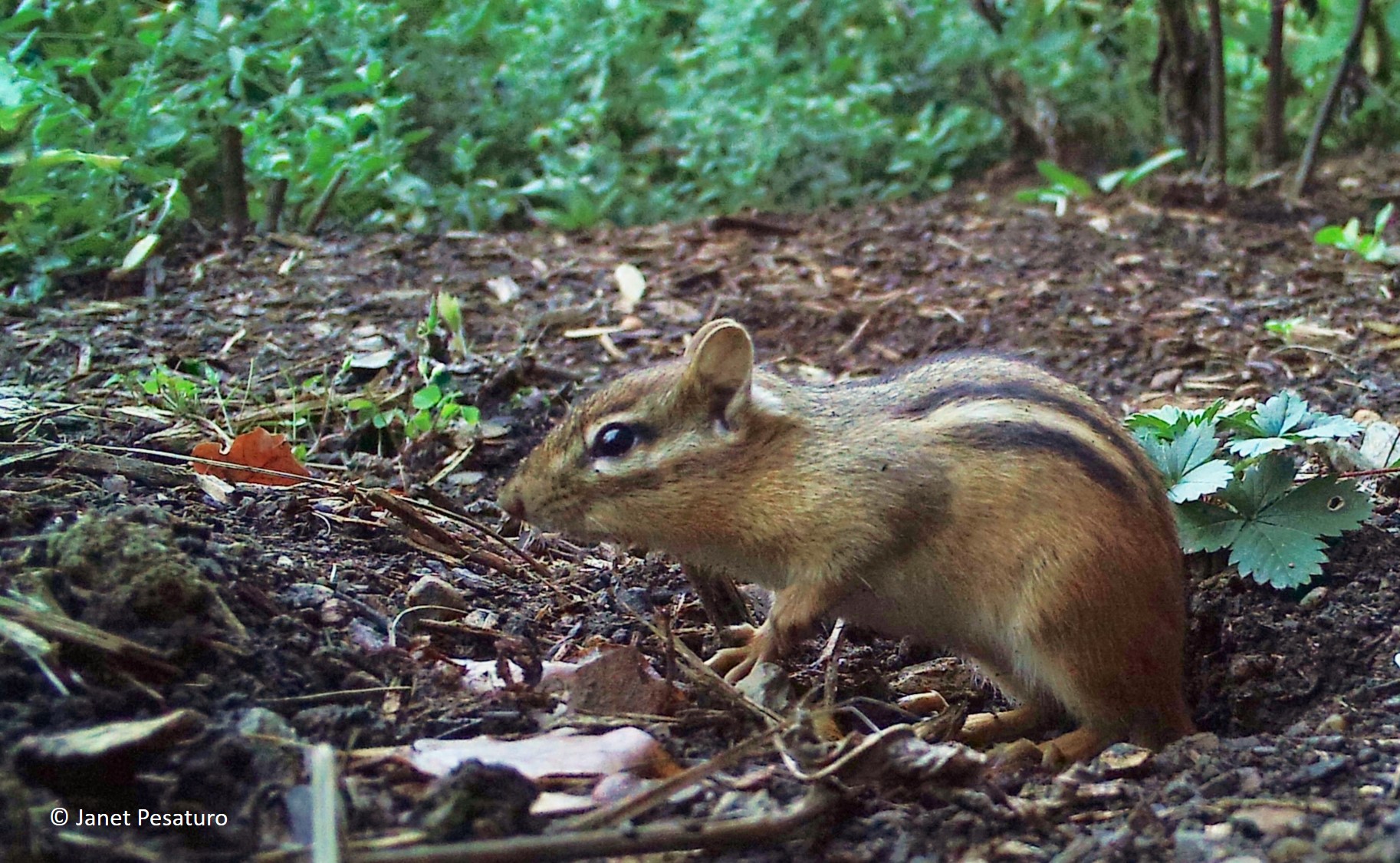Chipmunks, Hibernation, and Climate Change

Eastern chipmunks hoard nuts and seeds to consume in winter between bouts of torpor. This one carries away an acorn in October, probably to its larder. (Homemade camera trap: Canon 60D with Nikon SB28 flash)
The eastern chipmunk (Tamias striatus) copes with winter by storing food, rather than body fat, and by entering torpor for days at a time, waking up in between to nibble its cache. It begins cycling through torpor only when and if it cannot find enough food to meet its energetic demands. Food availability obviously influences hibernation, but so does ambient temperature, because the animal’s caloric requirement is higher in colder weather. The colder the temperature or the scarcer the food availability, the earlier the onset of hibernation and the longer the bouts of torpor. Individuals in the North spend more time sleeping in winter than those in the South. So how well do we expect chipmunks in the North to cope with climate warming? Might they thrive on less sleep, like their southern cousins?

An eastern chipmunk enters its burrow in mid-October in Massachusetts. In October chipmunks are busy caching food, and by November, most begin cycling in and out of torpor. (Bushnell NatureView with close focus lens)
One study addressed exactly that question. Radio-collared chipmunks in southeastern NY were monitored for seven winter, between 2000 and 2007. Five of those winters were normal, in terms of temperature. During those normal winters, 100% of the collared chipmunks cycled through bouts of torpor, and 88% of them survived winter. However, during the record warm winters of 2001-2002 and 2006-2007, only 40% of the collared chipmunks entered torpor, and those that did hibernate had shorter bouts of torpor. Only 11% of the collared chipmunks survived those winters.

An entry hole to a chipmunk’s burrow. Note that there is no mound of excavated soil. This is because chipmunks remove soil through a different hole, a “work hole”, which they plug upon completion.
That is a devastating mortality rate and it’s somewhat surprising because, after all, chipmunks evolved with the flexibility to be more active when winters are milder. But maybe the key is the fact that the two warm winters during the study were unusually warm. In fact, they were the two warmest winters in southeastern NY in almost a hundred years. Perhaps the chipmunks in northern climes are just not adapted to extremely mild winters, and whatever physiological mechanism that triggers hibernation wasn’t calibrated for those temperatures. In other words, torpor was switched off even though the animals were not able to meet their energetic requirements.
That study on chipmunks, hibernation, and climate change causes me to reconsider my delight in finding a black bear awake last winter. I was thrilled to get the photos, but perhaps the winter wanderings of bears are a sign of a similar problem. See Black Bear Awake in February.

An eastern chipmunk pops up from its burrow. (Bushnell NatureView with close focus lens)
Sources and Further Reading
Frank, C. L. “The Relationship Between Climate Warming and Hibernation in Mammals.” In Temperature Adaptation in a Changing Climate: Nature at Risk, edited by K. B. Storey and K. K. Tanino. 120-130. Wallingford, Oxfordshire, United Kingdom, 2011.
French, A. R. “Interdepency of Stored Food and Changes in Body Temperature During Hibernation of the Eastern Chipmunk, Tamias striatus.” Journal of Mammology. 81 (2000): 979-985.

Interesting post and very good photos.
Thanks, Woody!
Thanks for another interesting and informative read- keep them coming!
I downloaded a copy of the article you referenced re: climate warming. I’m not sure I want to read it.
Oh, it’s a good, though rather confusing read. There’s much more to the story than I discussed, but I wanted to keep the post brief so people would read it. He discusses research showing effects of temperature on polyunsaturated fat content of plants, and those fats seem involved in triggering hibernation. Unfortunately, he did not state (or if he did, I couldn’t find it) the causes of death of the chipmunks during the warm winters, so we don’t even know that they starved. It could be that there was some confounding variable, like a shortage of other small mammals resulting in increased predation pressure on active chipmunks during those winter. So while the results are concerning, I don’t think we can really draw a clear line from climate warming to increased chipmunk mortality. If you read the whole article, let me know what you think.
Going to try to be a little optimistic here and hope that those 11% that survived pass on the genes that gave them the ability to do so before climate change does the species in. Although the more one reads the more pessimistic one becomes. I once read that temperature increase results in a drastic reduction in male sea turtles.Also that plants are flowering/ fruiting earlier and being out of syn with birds/ insects. It’s getting to be a nightmare.
Hi Linda, sorry for the delay in responding – I was away when your comment came in. Good on you for holding on to optimism. We need to be able to face the seriousness of climate change without giving up, so we can do our part, and maybe inspire others to do so.
OMG. I worry about my little “pet”, Rodney, who is curled up in his den outside my kitchen window. I worry about climate problems and whether he can survive them. Over the last 4 days, we’ve had monsoon-like, torrential rain in lower NY state; i’m not sure Rodney can survive these conditions; wouldn’t the ground be flooded ? wouldn’t his den be flooded ? I made sure he had a huge supply of nuts and seeds, but if everything gets soaking wet in his burrow, can’t his food supply be ruined by rot and mildew ? Maybe people will call me nutty to worry about a chipmunk, but this guy’s special and has a boatload of chipmunk charisma. I’m rooting for Rodney, i love him !!
Hi Rena, I so appreciate your message because I’ve known people dead set on getting rid of chipmunks (for unclear reasons, since they generally do little to no harm to humans). Severe flooding can be lethal for burrowing rodents, but I have read that chipmunks dig drainage tunnels beneath their nest and food storage chambers, so a lot of water can collect before it gets the nest and food wet. Also if it’s not very cold, Rodney may well wake up and emerge from his burrow if his nest gets wet. Some of his food may spoil, but some won’t and given that you have supplemented his stash, he’ll likely have plenty to survive winter. Hope that helps. Best wishes to you and Rodney!
Thank you for your in depth reply regarding Rodney’s situation. I am finding your thoughts comforting. I just hope i see my Little Buddy pop up in Springtime, a sort of Punxatawney Rodney. Until i see him outside my kitchen window, i will continue to be fairly tense about him; the weather is off the charts abnormal; our yard has been flooded twice in the last few weeks, with ponding on the grass near Rodney’s den. Don’t know how he’ll do down there, but I hope and pray he will be ok. I’ve always enjoyed chipmunks, but Rodney really does have chipmunk charisma; he gets into some unusual postures and you can’t help but notice and enjoy him; one thing he does is stand, legs straddled, upright, like the little person he is; he’ll stand there like that for great lengths of time. Never seen a chipmunk like him. And i can’t even entertain the idea of people wanting to exterminate these little charmers. God created all life and it’s all beautiful and valuable. You have these adversarial types that do not enjoy or respect nature; they want to conquer and kill it so they can feel “superior.” Well, the old-style of subduing nature has gotten us to this point; the entire planet is poisoned and dying. Don’t get me started. For now, i am praying for Rodney’s well being every day. Thank you again for A) being receptive and not dismissive, and B) for your thoughtful and comforting answers.
Glad to have helped. You might enjoy the book “Eastern Chipmunks: Secrets of their Solitary Lives” by Lawrence Wishner. It has a lot of scientific information but is told in a humorous, storybook style. All his “study subjects” are named and their individual personalities described. I think you’d really enjoy it. It’s one of my favorite natural history books.
ooooo, i’m excited. I have to get that. I’ve been wanting to learn more and have not found too much info by combing Youtube, etc. Thanks for the recommendation; i’m certain i will love it !!! PS how can i get the comments to show up in my email ?
I have about zero tech ability; i don’t want to have to hunt for the comments but have them come right to the In box. Thanks again.
Good question, I don’t know how to make them come to your inbox. Sorry about that. I know how things happen on my end, but not on the other end.
Wishner can probably be downloaded and read online. To buy it, it costs hundreds of dollars, which seems quite exorbitant. I will try to read it online; sure can’t pay 400 bucks. PS Even though it’s quite cold here, being NYS in january, i saw Rodney both today and yesterday; at least it seems to be him. I fed him a handful of hazlenuts. This is confirming what i was worried about; that his food stores were ruined by the relentless, monsoon like rains we’ve had. Rodney was forced to leave his den and forage. Fortunately for him, i can bring him food and he can also graze under the bird feeder and get lots of sunflower seeds. So far, the little guy’s making a go of it; unless it’s a look-alike.
Good to know that Rodney is still with us! If you can’t find that book downloadable online, check amazon every now and again, because often there is a used copy for cheap. I got mine on amazon (used) for $20. Right now there’s a used copy for about $90. Third party sellers sometimes charge ridiculous prices for old books, I think maybe to give people the impression they are collectors items.
oh, i’m dying to read this book. I don’t have a spare 90 bucks, so am trying to access it online. Tried this yesterday and got nowhere. Oddly, when i tried the same thing a month ago, i did find it, but had to go do other things after i read it for a while. Yeah, i’m sure there are all kinds of “tech-y” things i should know about this, saving, bookmarking, whatever….. i’m too old to change now.
Not all books are available free online. $90 was the price of a copy at the time I wrote my last comment. Keep watching it on amazon and you might eventually be able to get it for $20.
I also worry about my favorite “pet” chipmunk this spring. She is so friendly and special but last year built 3 dens for some reason, the last one in October. I fed her everything several times a day to make sure she had enough for winter. In October she was infected with a Bot fly larva on one cheek.
It came out in 3 weeks but I hope infection didn’t kill her, late stocking up on food and all the snow and ice covering her burrow this winter. All other chipmunks (5) have emerged but not her. I am so upset.
So sorry. I don’t know where you are, but in my area (MA) I don’t think all the chipmunks are up yet. I’ve seen very little activity so far. I don’t think they starved because there were plenty of acorns around here last fall. Maybe she will emerge soon.
I am following the last two posts with rapt attention. It is the time of year for Rodney (and his cronies) to emerge and mate/ start a family, but NO Rodney !! No chipmunks anywhere in my yard or in the woods out back; and my area is usually teeming with them. It’s nearly April 5th; what is going on ?? where are these critters ?? I’m feeling disappointed and a little concerned.
I really don’t know what’s going on with them but we are seeing the same thing. Still very little chippy activity so far.
PS While i was waiting for Rodney’s return (over the winter) i got the Wishner book; it’s very enjoyable, photos are beautiful and there’s a lot of information in there. Great read for chipmunk lovers and all nature lovers.
I’m glad you got a copy. I thought you’d like it. I thought it was an especially enjoyable and informative read, not to mention amusing.